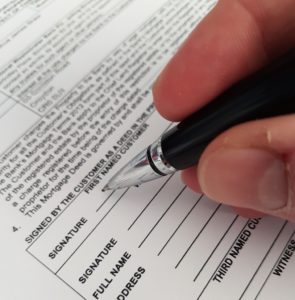The implications of signing a Mortgage Deed
 As we are instructed by your mortgage lenders it is our obligation to advise you of the implications of the mortgage document and your obligations as a borrower generally.
As we are instructed by your mortgage lenders it is our obligation to advise you of the implications of the mortgage document and your obligations as a borrower generally.
Should you own another property which is subject to a mortgage/charge this must be revealed to the Mortgagees of the property which you are currently purchasing. Failure to disclose this information could amount to mortgage fraud so if you do own any other properties then please let us know immediately.
Once you have completed the mortgage by signing the documentation and drawing down the funds, you are obliged to make the interest payments and provided you continue to do so throughout the term of the mortgage and comply with any other terms of the mortgage, you are basically still in control of your own home. However, we cannot emphasise enough that once you fall behind with your mortgage payments the situation changes dramatically and you will find that your lender have certain powers that they can exercise. For instance, they could if they follow the proper procedures, obtain an order for possession of the house from the Court and if you then fail to leave, you will be in contempt of Court.
If when you leave, you leave behind any personal possessions these can be sold by your mortgage lender although they do have an obligation to account to you for the proceeds of sale.
Once repossessed, your mortgage lender has complete control over the sale of the property and this is out of your hands. You might well feel that they are not conducting the sale in the best way that you see fit. For instance, you may feel that they have agreed a sale at less than the market price but you should bear in mind that it is their obligation to stop interest building up. A lot of people do not realise that once they have been repossessed their obligation to repay the debt continues until it is repaid. Therefore the longer any delay in sale the greater the interest builds up and sometimes it is more efficient for the lenders to sell for a little less than the market price in order to obtain a quick sale and repay the debt.
If they sell and the sale proceeds are insufficient to cover their debt the difference remains outstanding as a debt between you and the mortgage lender until you are able to repay them. Some borrowers have to pay a Mortgage Indemnity Insurance premium when they take out their mortgage and this premium is often deducted from the advance or added to the mortgage payments and is a “one off” premium. This is an insurance policy taken out by the lenders with an insurance institution who agree to underwrite and reimburse the lender a proportion of any shortfall in the mortgage following completion of a sale. However, quite often this amount is insufficient to cover the shortfall and you must pay the balance and also the insurance company has a right to look to you to repay them the amount paid out. Therefore, although the debt to the mortgage lender is reduced, your overall indebtedness remains the same.
Quite often the mortgage is an endowment mortgage where you offer an endowment policy by way of collateral/secondary security. Please note that you are obliged to keep that policy alive and to pay the premium. Quite often this is formally deposited with the lender but some lenders agree that you may retain the policy and leave you responsible for keeping it up. If you fail to do so you may find that you may lose an advantageous rate of interest and you also expose your estate on death to a debt that it may not be able to cover which is obviously prejudicial to the interest of any family that you may have.
If your mortgage offer requires you to undertake to carry out certain works, although the building society do not always to inspect these works, they do have the right to do so and if you fail to comply with your undertaking you would be in breach of the terms of your mortgage which would leave the lender with a variety of options including doing the works themselves and adding the cost to the mortgage debt or ultimately repossessing the property.
You may have taken out a fixed rate mortgage. If you have please be aware that there is usually a penalty of a few months interest if you wish to redeem the mortgage in whole or in part in the initial fixed rate period and sometimes for a period subsequently. Some mortgages require you to pay 3 months interest when you redeem whether you have a fixed rate mortgage or not and it is always advisable to check.
Finally, it may be that you have bought your property jointly and have a joint mortgage with another person who may be your spouse or otherwise. It is most important that you are aware of your joint and several liability i.e. you may believe that you are each of you only liable for half the mortgage. This is not the case and if your partner is unable to pay the mortgage the whole mortgage debt could fall to you even though as between yourself and your partner you may have a right of indemnity. If your mortgage is with a bank and you also hold another account with them you will quite often find that whether you realise it or not, your house is security for any overdraft or other borrowings that you may have with the bank either on a business account or personally. Non-working partners quite often do not realise that by signing the mortgage they are as liable as their working partners for the whole of the mortgage debt and that if their partners incur debts the house can be sold to pay them whether the non-working partner was responsible for those debt and was even ignorant of them.


